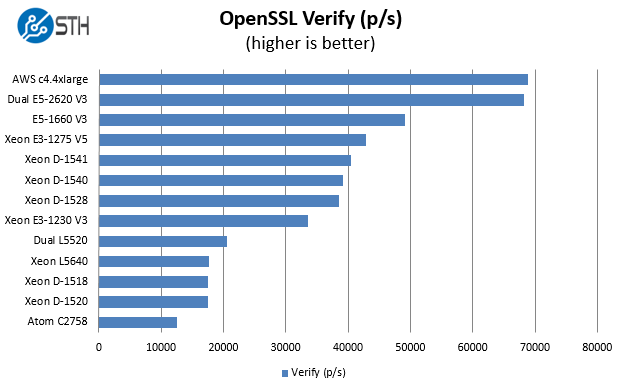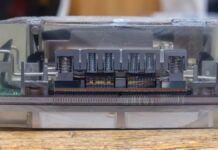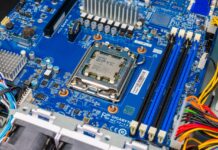Today we have our Intel Xeon D-1541 benchmarks. Continuing the tradition of having the first benchmarks of the Xeon D-1540 and Xeon D-1520 with the initial wave of Xeons. We had the first Xeon D-1518 benchmarks a few weeks ago for another 4 core/ 8 thread processor and the first Xeon D-1528 benchmarks a 6 core / 12 thread part. The Intel Xeon D-1541 is a minor update to the Intel Xeon D-1540 with less than a 5% increase in clock speeds for its 8 cores and 16 threads. The wave 2 part does bring support for both DDR4-2400 and SR-IOV.
For those interested, here is where the Xeon D-1541 falls in the March 2015/ November 2015 launch lineup:
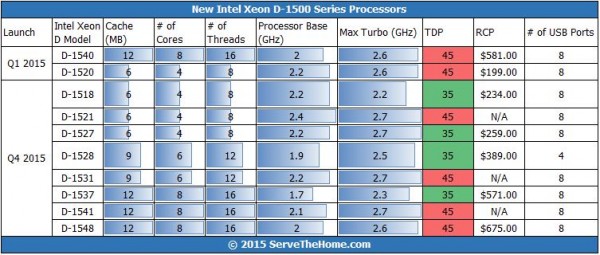
We do expect this to be a popular part as ASRock Rack, Gigabyte and Supermicro are all using the chip to replace the outgoing D-1540.
Test Configuration
Our test platform is one that we are not able to publish yet as it is being hosted by our labs. We will hope to have a review of the platform soon, but this is also our second non-Supermicro Xeon D solution we have benchmarked. The first was an Intel development system.
- CPU: Intel Xeon D-1541
- Platform: Updated with review in the coming weeks
- Memory: 64GB – 4x Samsung 16GB DDR4 2133MHz ECC RDIMM
s
- SSD: 1x Intel DC S3700 400GB
- Operating System: Ubuntu 14.04.3 LTS, OpenSUSE 13.2
We did not get to use DDR4-2400 ECC RDIMMs with this platform due to availability.
Intel Xeon D-1541 Benchmarks
For our testing we are using Linux-Bench scripts which help us see cross platform “least common denominator” results. We are using gcc due to its ubiquity as a default compiler. One can see details of each benchmark here. We are likely going to update the Linux-Bench in the near future with a few new tests as well as an even simpler to use/ faster revision, but for now, we are using our old Ubuntu 14.04.3 version.
c-ray 1.1 Performance
We have been using c-ray for our performance testing for years now. It is a ray tracing benchmark that is extremely popular to show differences in processors under multi-threaded workloads.
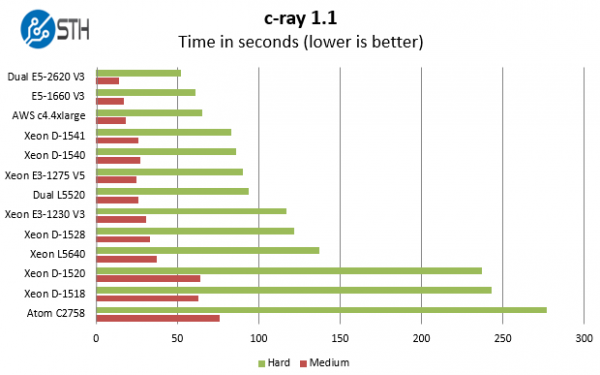
As one can see, the Xeon D-1541 is a slight improvement over the D-1540 overall. We added an AWS c4.4xlarge, dual Xeon E5-2620 and Xeon E5-1660 V3 to the mix just to get a bigger variety. You will see we are now have five different Intel Xeon D SKUs on the chart.
7-zip Performance
7-zip is a widely used compression/ decompression program that works cross platform. We started using the program during our early days with Windows testing. It is now part of Linux-Bench.
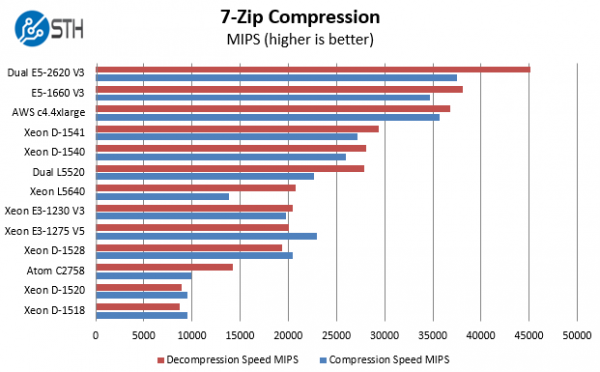
Compression is a major function in today’s workloads and we see the 8 core / 16 threads performs well. If you are looking for higher-end compute, and can spare the power, the Intel Xeon E5-1660 V3 still offers extremely competitive pricing and has the ability to scale to a higher RAM total making it a solid choice.
NAMD Performance
NAMD is a molecular modeling benchmark developed by the Theoretical and Computational Biophysics Group in the Beckman Institute for Advanced Science and Technology at the University of Illinois at Urbana-Champaign. More information on the benchmark can be found here.
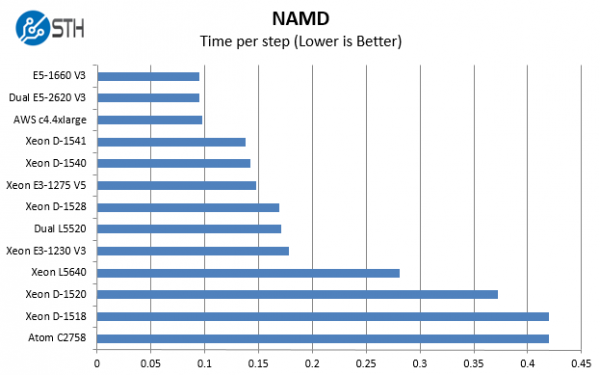
With NAMD we see a clear yet relatively small improvement by the Xeon D-1541 over the D-1540.
Sysbench CPU test
Sysbench is another one of those widely used Linux benchmarks. We specifically are using the CPU test, not the OLTP test that we use for some storage testing.
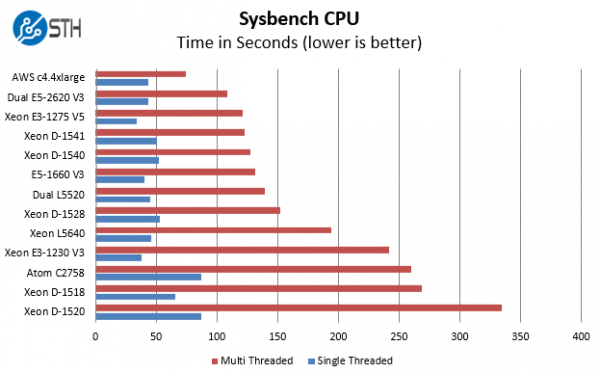
We sorted this chart on the multi-threaded results. Practically that means that the blue bars representing single threaded performance would change the ranking. Chips like the E3-1275 V3 and E5-1660 V3 are much better options if one is looking toward single threaded performance.
OpenSSL Performance
OpenSSL is widely used to secure communications between servers. This is an important protocol in many server stacks. We first look at our sign tests:
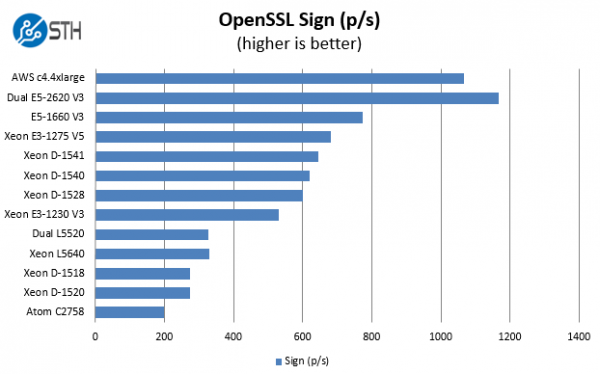
We sorted these charts by the OpenSSL Verify figures hence why the AWS EC2 instance seems out of place. Moving to the verify results:
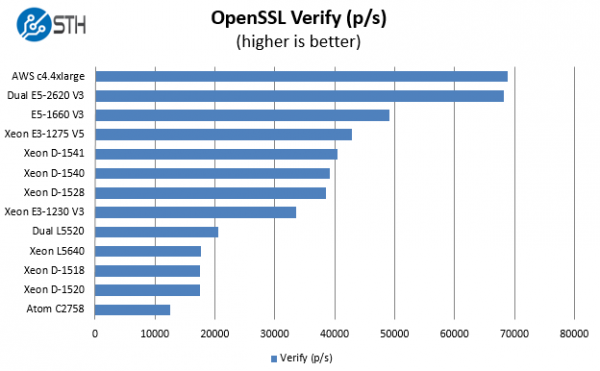
The Intel Xeon D-1541 is still bested by a current generation (and less expensive) Intel Xeon E3-1275 V5 but the gap is relatively small.
UnixBench Dhrystone 2 and Whetstone Benchmarks
Of course, these chips are not meant for heavy compute but we pick out the UnixBench 5.1.3 Dhrystone 2 and Whetstone results to show some of the raw performance they are capable of. UnixBench is widely used so it is a good comparison point.
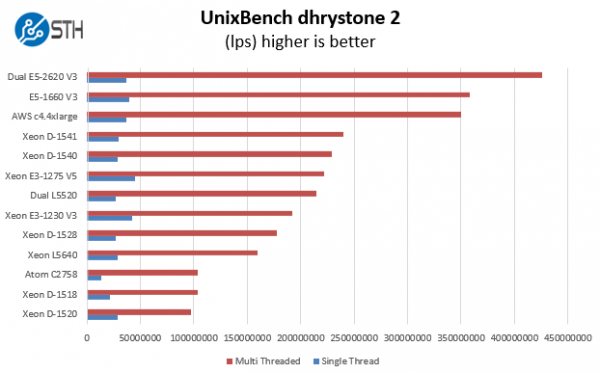
As we increase the core counts the multi-threaded performance dominates the chart scale. We see the D-1541 perform well and pull slightly ahead of the D-1540 predecessor as well as the E3-1275 V5 on multi-threaded tests.
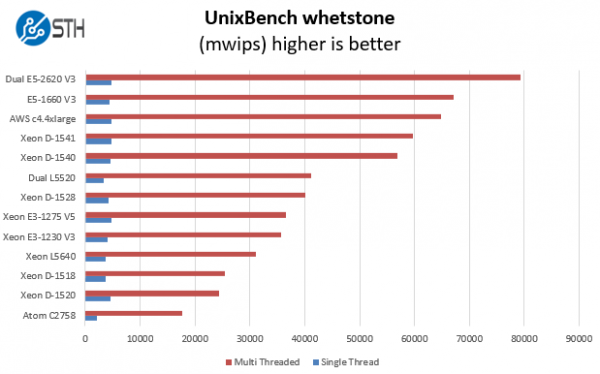
On the floating point side we see a similar trend. The new Xeon D-1540 bests the dual 4 core/ 8 thread Xeon L5520 system at much lower power.
HardInfo CPU Cryptohash
Perhaps some of the most standard benchmarks that come along with many versions of Ubuntu, the hardinfo suite has been a mainstay at STH.
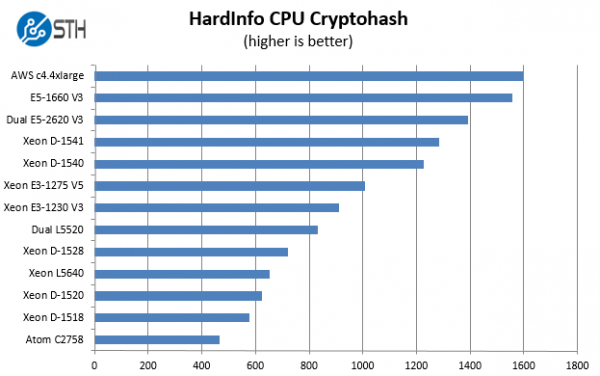
This is certainly and excellent showing by the Intel Xeon D-1541.
Conclusion
Part of STH’s hosting cluster is actually a number of 1U Intel Xeon D-1540 servers so the Xeon D-1540 and D-1541 we are well aware of. The performance of the parts is overall excellent so long as you can handle lower single thread performance and do not need more RAM. The modest 100MHz clock speed bumps do help a bit in single thread workloads which is welcome. The big story, is of course, the support for SR-IOV. We may post a subsequent update but word from Intel is that this is one of their first Xeon SKUs (across all lines) to support DDR4-2400 RAM. We will hopefully have some in the lab soon to test with but we expect the impact to be relatively minor.

